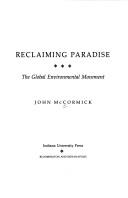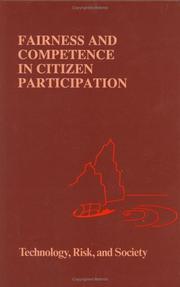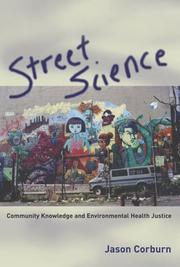| Listing 1 - 10 of 13 | << page >> |
Sort by
|

ISBN: 0253349524 Year: 1989 Publisher: London Belhaven Press
Abstract | Keywords | Export | Availability | Bookmark
 Loading...
Loading...Choose an application
- Reference Manager
- EndNote
- RefWorks (Direct export to RefWorks)
Book
ISBN: 9781788976169 1788976169 1788976177 Year: 2019 Publisher: Cheltenham, UK : Edward Elgar Publishing Limited,
Abstract | Keywords | Export | Availability | Bookmark
 Loading...
Loading...Choose an application
- Reference Manager
- EndNote
- RefWorks (Direct export to RefWorks)
Environmental law --- Environmental policy --- Public opinion --- Citizen participation --- Environmental policy - Citizen participation
Book
ISBN: 082409784X Year: 1990 Publisher: New York London Garland
Abstract | Keywords | Export | Availability | Bookmark
 Loading...
Loading...Choose an application
- Reference Manager
- EndNote
- RefWorks (Direct export to RefWorks)
Book
ISBN: 9781541758230 9781541758223 1541758234 1541758226 Year: 2021 Publisher: New York, N.Y. PublicAffairs
Abstract | Keywords | Export | Availability | Bookmark
 Loading...
Loading...Choose an application
- Reference Manager
- EndNote
- RefWorks (Direct export to RefWorks)
Recycle. Fly less. Eat less meat. These are some of the tactics that we've been told can slow climate change. But most of these recommendations are a result of a multi-pronged marketing campaign that has succeeded in placing the responsibility for fixing climate change squarely on the shoulders of individuals. Fossil fuel companies have followed the example of other industries deflecting blame (think 'guns don't kill people, people kill people') or greenwashing (think of the beverage industry's 'Crying Indian' commercials of the 1980s). Meanwhile, they've blocked efforts to regulate or price carbon emissions, run PR campaigns aimed at discrediting viable alternatives, and have abdicated their responsibility in fixing the problem they've created. The result has been disastrous for our planet. The author argues here that all is not lost. He draws the battle lines between the people and the polluters - fossil fuel companies, right-wing plutocrats, and petrostates. And he outlines a plan for forcing our governments and corporations to wake up and make real change, including : a common-sense, attainable approach to carbon tax - an overhaul of the flawed Green New Deal; allowing renewable energy to compete fairly against fossil fuels debunking the false narratives and arguments that have worked their way into the climate debate and driven a wedge between even those who support climate change solutions how to combat climate doomism. With immensely powerful vested interests aligned in defense of the fossil fuel status quo, the societal tipping point won't happen without the active participation of citizens everywhere aiding in the collective push forward. This book will reach, inform, and enable citizens everywhere to join this battle for our planet.
Environmental policy --- Climatic changes --- Green New Deal --- Citizen participation --- Government policy --- Community organization --- Relation between energy and economics --- Environmental protection. Environmental technology --- CLIMATIC CHANGES--GOVERNMENT POLICY--CITIZEN PARTICIPATION --- ENVIRONMENTAL POLICY--CITIZEN PARTICIPATION --- GLOBAL WARMING--PREVENTION --- GREEN NEW DEAL --- Environmental policy - Citizen participation --- Climatic changes - Government policy - Citizen participation

ISBN: 0792335171 079233518X 9401101310 9780792335177 Year: 1995 Volume: 10 Publisher: Dordrecht Kluwer
Abstract | Keywords | Export | Availability | Bookmark
 Loading...
Loading...Choose an application
- Reference Manager
- EndNote
- RefWorks (Direct export to RefWorks)
Political systems --- Community organization --- Environmental protection. Environmental technology --- Environmental policy --- Citizen participation --- Citizen participation. --- #SBIB:35H501 --- #SBIB:324H50 --- Bestuur en samenleving: netwerken, inspraak, participatie, interactief beleid --- Politieke participatie en legitimiteit (referenda, directe democratie, publieke opinie...) --- Environmental policy - Citizen participation
Book
ISSN: 22738258 ISBN: 9782735126613 2735126617 Year: 2020 Publisher: Paris : Éditions de la Maison des sciences de l'homme,
Abstract | Keywords | Export | Availability | Bookmark
 Loading...
Loading...Choose an application
- Reference Manager
- EndNote
- RefWorks (Direct export to RefWorks)
Démocratie participative. --- Environnement --- Pollution --- Protection --- Participation des citoyens --- Lutte contre --- Environmental policy --- Environmental protection --- Political participation --- Deliberative democracy --- Citizen participation --- Environmental policy - Citizen participation --- Environmental protection - France --- Political participation - France
Book
ISBN: 047194940X 9780471949404 Year: 1995 Publisher: Chichester: Wiley,
Abstract | Keywords | Export | Availability | Bookmark
 Loading...
Loading...Choose an application
- Reference Manager
- EndNote
- RefWorks (Direct export to RefWorks)
Environmental policy --- Environmentalism --- Green movement --- Nature --- Citizen participation --- History --- Effect of human beings on --- #SBIB:316.334.5U43 --- #SBIB:324H74 --- Sociologie van stad en platteland: milieubewegingen --- Politieke verandering: sociale bewegingen --- Geografie --- Citizen participation. --- Landschapskunde --- Milieu en ecologie. --- Environmental policy - Citizen participation --- Environmentalism - History --- Green movement - History --- Nature - Effect of human beings on
Book
ISBN: 9264195491 9264195378 Year: 2014 Publisher: [Paris, France] : OCDE,
Abstract | Keywords | Export | Availability | Bookmark
 Loading...
Loading...Choose an application
- Reference Manager
- EndNote
- RefWorks (Direct export to RefWorks)
Il est indispensable de bien comprendre les facteurs qui influencent les décisions des individus à l’égard de l'environnement si l’on veut élaborer des stratégies de croissance qui favorisent des modes de vie plus « verts ». Les récents travaux menés par l'OCDE à partir d’enquêtes périodiques auprès de plus de 10 000 ménages dans un certain nombre de pays et de domaines représentent un progrès décisif pour autant qu'ils apportent de nouveaux éclairages sur les mesures réellement efficaces. Cette publication présente une synthèse des données issues de la dernière enquête en date, axée sur cinq domaines (énergie, alimentation, transport, déchets et eau) et réalisée dans onze pays : Australie, Canada, Chili, Corée, Espagne, France, Israël, Japon, Pays-Bas, Suède et Suisse. La nouvelle enquête confirme l’importance de fournir les bonnes motivations pour influer sur nos décisions. Les résultats indiquent que les mesures telles que l’étiquetage et les campagnes d’information publique ont aussi un rôle significatif et complémentaire à jouer. Inciter un changement favorable de comportement demande un mélange de ces instruments.
Environmental policy -- Citizen participation. --- Environmental policy. --- Sustainable living -- Environmental aspects. --- Business & Economics --- Economic History --- Environmental policy --- Sustainable living --- Citizen participation. --- Environmental aspects. --- Environment and state --- Environmental control --- Environmental management --- Environmental protection --- Environmental quality --- State and environment --- Ecological living --- Green living --- Living, Sustainable --- Government policy --- Environmental auditing --- Alternative lifestyles --- Environmentalism --- Green movement

ISBN: 0674089235 0674089227 Year: 1997 Publisher: Cambridge, Mass. Harvard University Press
Abstract | Keywords | Export | Availability | Bookmark
 Loading...
Loading...Choose an application
- Reference Manager
- EndNote
- RefWorks (Direct export to RefWorks)
Environmental protection. Environmental technology --- Environmental policy --- Environmental risk assessment --- Risk assessment --- Precautionary principle --- Environment and state --- Environmental control --- Environmental management --- Environmental protection --- Environmental quality --- State and environment --- Environmental auditing --- Citizen participation&delete& --- Popular works --- Government policy --- Citizen participation --- Environmental risk assessment - Popular works. --- Environmental policy - Citizen participation - Popular works.

ISBN: 1282097172 9786612097171 0262270803 1423747003 9780262270809 9781423747000 9780262033336 026203333X 9780262532723 0262532727 9781282097179 6612097175 Year: 2005 Publisher: Cambridge, MA MIT Press
Abstract | Keywords | Export | Availability | Bookmark
 Loading...
Loading...Choose an application
- Reference Manager
- EndNote
- RefWorks (Direct export to RefWorks)
When environmental health problems arise in a community, policymakers must be able to reconcile the first-hand experience of local residents with recommendations by scientists. In this highly original look at environmental health policymaking, Jason Corburn shows the ways that local knowledge can be combined with professional techniques to achieve better solutions for environmental health problems. He traces the efforts of a low-income community in Brooklyn to deal with environmental health problems in its midst and offers a framework for understanding "street science"--decision making that draws on community knowledge and contributes to environmental justice.Like many other low-income urban communities, the Greenpoint/Williamsburg neighborhood of Brooklyn suffers more than its share of environmental problems, with a concentration of polluting facilities and elevated levels of localized air pollutants. Corburn looks at four instances of street science in Greenpoint/Williamsburg, where community members and professionals combined forces to address the risks from subsistence fishing from the polluted East River, the asthma epidemic in the Latino community, childhood lead poisoning, and local sources of air pollution. These episodes highlight both the successes and the limits of street science and demonstrate ways residents can establish their own credibility when working with scientists. Street science, Corburn argues, does not devalue science; it revalues other kinds of information and democratizes the inquiry and decision making processes.
Communities. --- Environmental health --- Environmental justice. --- Environmental policy --- Citizen participation. --- Public opinion. --- Eco-justice --- Environmental justice movement --- Global environmental justice --- Environmental quality --- Health --- Health ecology --- Community --- Health aspects --- Environmental aspects --- Environmentalism --- Social justice --- Public health --- Environmental engineering --- Health risk assessment --- Social groups --- ARCHITECTURE/Urban Design --- ENVIRONMENT/Environmental Politics & Policy --- Sociology of health --- Environmental planning --- comprehensive plans [reports] --- ruimtelijke ordening --- omgevingsproblematiek --- participatie --- Environmental justice --- Communities --- Public opinion --- Citizen participation --- Environmental health - Public opinion --- Environmental health - Citizen participation --- Environmental policy - Citizen participation
| Listing 1 - 10 of 13 | << page >> |
Sort by
|

 Search
Search Feedback
Feedback About UniCat
About UniCat  Help
Help News
News